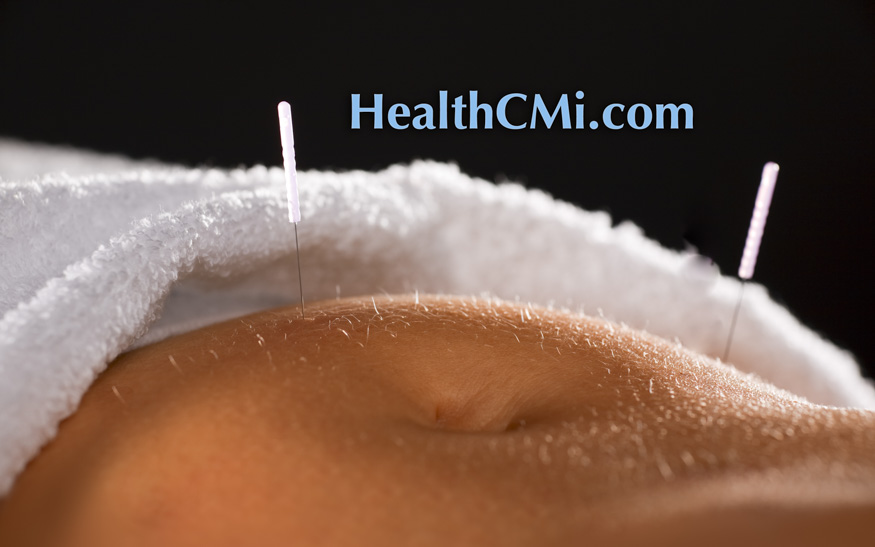
Acupuncture is effective for the treatment of ulcerative colitis. In a controlled study incorporating lab results documenting beneficial changes in pro-inflammatory cytokine levels, researchers at the Tangshan Hospital of Traditional Chinese Medicine determined that warm needle acupuncture integrated with the use of the pharmaceutical drug omeprazole outperforms the sole use of omeprazole for the alleviation of ulcerative colitis. [1]
Efficacy rates were calculated with a scoring scheme based on the Baron system, where patients are given a score between 0 and 3. According to this system, 0 represented normal mucosa with no bleeding and a normal vascular pattern throughout the colon, 1 represented abnormal mucosa that is not expressly hemorrhagic, 2 represented mucosa bleeding upon light intervention of an instrument with no spontaneous bleeding, and 3 represented spontaneous bleeding before the instrument was applied. The total efficacy rate was classified into the following four categories:
- Recovered: mucosa lesions healed or point 0 on Baron scoring system
- Significantly effective: Baron score declined by at least two points
- Effective: Baron score declined by one point
- Ineffective: cicatrix (scar) deteriorated or Baron score remained unchanged
Upon completion of the treatment, 11 cases in the warm needle acupuncture integrated group 18 were “recovered,” 20 were “significantly effective,” 8 were “effective,” and 1 was “ineffective.” This resulted in a total efficacy rate of 97.9%, higher than that of the control group at 87.2%. Additionally, inflammation factors including serum interleukins IL-6 and IL-17 and transforming growth factor (TGF-β1) demonstrated more noticeable improvements in the group receiving acupuncture.
The HealthCMi team notes that the symptomatic improvements, healing of the intestinal tissue, and improvements in cytokine levels indicate that acupuncture improves patient outcomes. As a result, the HealthCMi team recommends acupuncture for the alleviation of ulcerative colitis.
The research team used the following design. From January 2020–December 2020, 94 patients with ulcerative colitis took part in the study. They were randomized into an omeprazole monotherapy group and a warm needle acupuncture integrated group, with 47 patients in each group. In the monotherapy control group, 24 patients were male, 23 patients were female, and the mean age of the patients was 44 ±9 years. Average course of condition was 3.41 ±0.73 years. In the combined treatment group, 25 patients were male, 22 patients were female, and the mean age was 46 ±8 years. Average course of condition was 3.59 ±0.80 years.
Admission criteria included repetitive or constant diarrhea, often with blood or pus, and stomach pain. Course of condition ranged from 4–6 weeks. Colonoscopies showed diffuse and continuous lesions of the rectum. Those with a history of using antibiotics or microecological preparations (gut microbiota composition applications) were excluded from the study.
Both groups were given an 8-week treatment course. Patients in the control group were administered omeprazole, four times daily, until the medication took effect. Patients continued taking the drug orally the following week. Dosages were gradually reduced.
For patients in the integrated therapy group, warm needle acupuncture was administered to patients in a supine position. The acupuncture needles were 0.30 × 40 mm. The following points received treatment:
- BL20 (Pishu)
- CV12 (Zhongwan)
- CV4 (Guanyuan)
- ST37 (Shangjuxu)
- ST36 (Zusanli)
- ST25 (Tianshu)
- SP3 (Taibai)
Needles at Pishu, Zhongwan, and Zusanli were connected to moxa, which was removed three minutes after burning out. For the remaining points, regular mild reinforcing and attenuating manipulation was employed. The needles were removed after 20 minutes. The treatment was performed daily for five consecutive days followed by two days of rest. The results demonstrate that acupuncture improves patient outcomes by 10%. Lesion healing, cytokine balancing, and symptomatic reductions demonstrate that acupuncture is effective for the alleviation of ulcerative colitis.
HealthCMi expert, Prof. Jeffrey Pang, L.Ac., has lectured on the alleviation of ulcerative colitis for decades and his family’s herbal formulas represent generations of experience of clinical success. A highlight from the Pang family for the treatment of ulcerative colitis is an herbal formula used to treat a mix of excess and deficient conditions including liver attacking spleen syndrome, intestinal deficiency, and damp-heat. The formula contains Dang Shen, Fu Ling, Bai Zhu, Bai Shao, Bai Tou Weng, Ma Chi Xian, Huai Hua Mi, Jin Yin Hua, Bai Jian Cao, Mu Xiang, Gan Cao, and Da Zao.
For this syndrome, auricular acupoints such as Shenmen, intestine, liver, spleen, San Jiao, and sympathetic nerve are often used with a selection of body style acupoints including ST25, BL25, ST36, SP9, ST37, and CV5. When deficiency is significant, raw foods, raw fiber, hot and spicy, sugary, and greasy foods are contraindicated as is alcohol consumption. Beneficial foods are often fresh tofu, Yi Yi Ren, Chi Xiao Dou, Shan Yao, and Lian Zi. Enjoy the HealthCMi catalog of acupuncture continuing education courses to learn more about Prof. Pang’s acupuncture and herbal medicine acupuncture CEU educational materials.
Reference:
[1] Zhang Dongdong, Zhang Yanjun, Zhu Yeshan, Efficacy Observation of Needle Warming Therapy Combined with Western Medication for Ulcerative Colitis, Shanghai Journal of Acupuncture, Issue 5, Volume 41, May 2022, 1005-0957 (2022) 05-0443-07.


